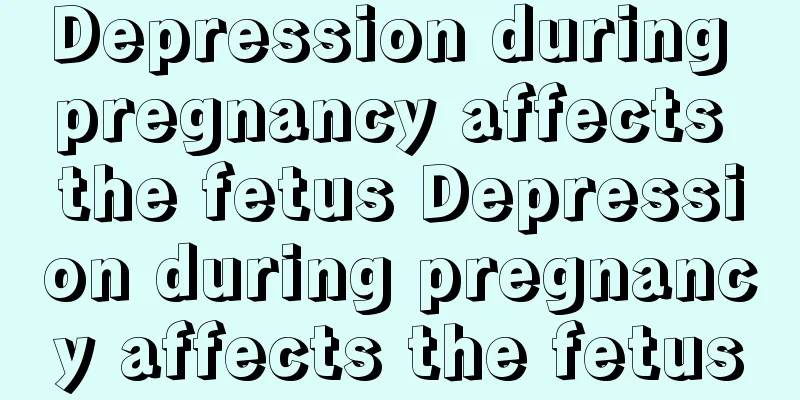Why does the baby's nose whirr when sleeping? Four reasons to pay attention to

|
The baby's body resistance is relatively weak, which requires us to take good care of the baby. So, what is the matter with the baby's nose whirring when sleeping? Why does my baby's nose make a whirring sound when he sleeps?Normal physiological reaction: the baby's body organs are not fully developed Why does the baby's nose make a whirring sound when sleeping: If there are no other symptoms, and there is no problem with the baby's physical and mental condition, then it is a normal physiological reaction caused by the incomplete development of the baby's body organs. Specific analysis: 1. Usually the baby's breathing is not so stable, and sometimes there will be irregular breathing. 2. This is because the baby's larynx is very soft, and part of the larynx will be deformed when breathing. When the air passes through the narrowed part, various sounds will be made. Tips: 1. After a few days, the baby's soft larynx will gradually develop and harden, and the sound will disappear. 2. Going outdoors frequently to breathe fresh air and bask in the sun can promote bone development. Baby's nasal mucus Why does the baby's nose make a wheezing sound when sleeping? The baby's nasal cavity is blocked by foreign objects such as nasal mucus, which causes the baby's nose to make a wheezing sound when sleeping. Specific analysis: The baby's nasal cavity is narrow and nasal secretions can easily cause blockage. You can use a cotton swab to gently roll out the secretions. Treatment method: If it is dry secretion, you should first apply some ointment or eye ointment, or use a cotton swab dipped in saline solution and drip it into the baby's nostrils. Be sure to use an appropriate amount to make it soft and no longer stick to the mucous membrane, then use a cotton swab to remove it. Nasal congestion due to cold Why does the baby's nose whirr and have runny nose when sleeping: If the baby's nose whirrs and has runny nose or runny nose, it indicates that the baby has a cold. Specific analysis: The medical factors that cause children's noses to wheeze when they sleep are usually symptoms of rhinitis or colds. Rhinitis is mainly related to physical constitution and weather problems, while colds are generally caused by colds. suggestion: Go to the pediatric or ENT department of the hospital in time for relevant examinations, receive symptomatic treatment if necessary, and keep warm to increase your resistance. Other diseases cause Why does the baby's nose make a wheezing sound when sleeping: Other diseases may cause the wheezing sound. Specific analysis: 1. Enlarged adenoids and tonsils are diseases unique to childhood, and these two diseases are also the reasons why babies' noses wheeze when they sleep. 2. Especially when babies are affected by temperature changes, malnutrition, decreased resistance or upper respiratory tract infection, the inflammation affects the tonsils and adenoids and causes further swelling, blocking the posterior nasal cavity and oropharynx, leading to gas obstruction and causing whistling noise. suggestion: Generally speaking, if snoring is clearly caused by enlarged tonsils or adenoids, resection is the main treatment method. What to do if your newborn baby makes noises while sleepingWhat should mothers do when they find that their newborn babies make noises while sleeping? First of all, mothers should not worry too much. You can check if the baby has symptoms of cold and runny nose, or listen to whether the baby's throat is inflamed, and then check if there is any foreign body in the baby's nasal cavity. If the baby's cold is ruled out, the baby's mental state is also very good, and there is no other discomfort, then there is no need to worry, this is the baby's normal phenomenon. If the baby has symptoms such as colds, mothers can see if the baby's symptoms are serious. If not too serious, you can give the baby some children's cold medicine. If the symptoms are more serious, it is better to go to the hospital for a clear check. If there is a foreign body in the baby's nasal cavity, wipe it clean with a cotton swab. In addition, pay attention to the indoor air not being too dry. If the baby is found to have an upper respiratory tract infection or bronchial infection, there is no need to worry too much. This is generally caused by hypoplastic laryngeal thyroid cartilage in newborns. You can supplement calcium and cod liver oil, and it will slowly improve. How to make your baby sleep soundly1. Encourage your baby to sleep regularly: Parents should train their baby to form a biological clock when the baby is still young, so that sleeping through the night becomes a habit. Babies need to develop a regular routine and supplement their sleep with naps during the day. Waking up your baby at the same time every morning will make his naps more regular. 2. Develop good napping habits: The baby's nap should be at a fixed time and place, generally at noon or early afternoon, such as starting at one o'clock in the afternoon and sleeping for half an hour to an hour. 3. Control the light and sound in the bedroom: Use light and sound to promote the formation of the baby's biological clock. Through the contrast of light and darkness, let the baby learn the difference between day and night, awake and asleep. 4. Follow the bedtime routine every day: Arranging an overall bedtime process is also helpful for the baby to develop regular sleeping habits. 5. Safe and comfortable bed environment: The best way is to create a safe and comfortable environment in the baby’s crib, like the mother’s warm embrace. Things to note when dealing with a baby's stuffy nose1. When using cotton swabs, be careful not to let the cotton swab hurt the nasal mucosa because babies will move around. 2. Babies will use sneezing to clear foreign objects from their nostrils, and they will also sneeze when suddenly exposed to cold air. This is a normal phenomenon. Unless you have a runny nose, there is no need to worry. 3. Let the baby breathe in some moist steam, which can also make it easier to clear the secretions in the nose and relieve nasal congestion. You can put hot water in the bathroom to make the steam diffuse, and let the baby breathe for 3-5 minutes before clearing the nasal mucus. 4. Pay attention to the problem of dry air. The baby's nose will feel uncomfortable and the room needs to be humidified. 5. If the nasal mucus is dry and severely blocked, you can ask the doctor to use special small instruments to treat it. Do not treat it casually. |
>>: Why are babies particularly sensitive? Four characteristics of highly sensitive children
Recommend
How can I get pregnant quickly? What should I do after I get pregnant?
Although many women have reached childbearing age...
How to correct a baby's pigeon-toed feet? At what age can a baby's pigeon-toed feet be corrected?
How to correct the baby's pigeon-toed feet is...
How to make baby rice cereal and the best baby rice cereal brands to choose
The gastrointestinal digestive system of babies i...
Will constipation during pregnancy affect the fetus? Will severe constipation affect the fetus?
Constipation in pregnant women is a very common t...
Can Dettol disinfectant be sprayed for disinfection? Can Dettol disinfectant be mixed with water for spraying?
It is not recommended to use Dettol disinfectant ...
What size should you pay attention to when buying a baby stroller? It should not be too small
First, the size should not be too small. Because ...
What is the normal fetal movement at six months of pregnancy? What does abnormal fetal movement indicate?
At six months of pregnancy, you can clearly hear ...
Can I eat yam after I get pregnant? Yam can promote fetal development
A few days ago, a pregnant mother asked me if I c...
What can you eat after childbirth to fight against aging? Postpartum anti-aging diet
Many women say that their physical fitness has de...
How old is the baby able to speak? How to train the baby to speak?
Babies will start babbling when they are 4 months...
Is it okay for an American mother to ask someone to photoshop the photo of her daughter after abusing her to death?
Every time I see a case of child abuse, I can'...
How to teach babies to talk
What new parents look forward to most is the firs...
What are postpartum hemorrhoids? Symptoms of postpartum hemorrhoids
Hemorrhoids are a disease that everyone is famili...
Why do babies like to bully friends who are younger than them?
The baby looks very well-behaved, but in kinderga...
What are the early symptoms of congenital heart disease in children and how to treat them for free?
Some babies are born with congenital defects, suc...









